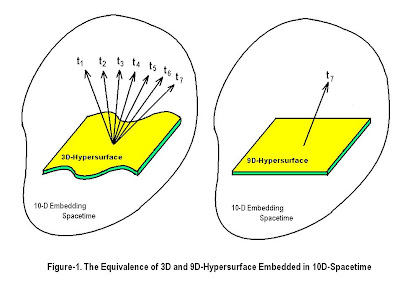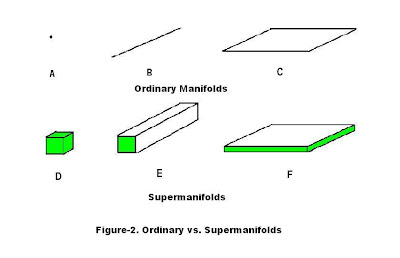One of the significant
physicists' misconceptions about nature is the uniqueness of time. When
physicists encounter higher-multidimensional surroundings in their theory, they
instinctively assign the extra-dimensions (beyond the ordinary four) as
spatial. This premise, regarding the inequality of space and time footing, is
evidence against the relativity principle.
The string theory, which
had its origins in experimentally observed features of the strong force,
requires the existence of six compactified extra spatial dimensions (a)
and the four known spacetime dimensions. This presumption leads the theory to
grave difficulties as it should deal with myriad different kinds of Callabi-Yau tiny
manifolds or other similar bizarre things.
On the other hand, the
grand relativity theory holds that the extra dimensions are temporal; thus,
circumventing such complexities. Therefore, we may regard a system such as our
world consisting of a 3D-space (hypersurface) embedded in 10D-manifold in which
all extra dimensions are temporal b). Under the grand
relativity theory, we have every right to transform it into, for instance,
9D-hypersurface embedding in the same 10D-manifold, by turning some of the
temporal dimensions into spatial (Figure-1). The latter is exceedingly simpler
than the former in terms of mathematical formulations, and yet it gives us the
same solutions.
Physicists are used to
oversimplifying their physical model using geometrical objects, such as 0D-point,
1D-line, and 2D-plane. However, one should be extremely cautious of using such
objects, having no thickness at all as he or she probes more in-depth into the
quantum realm. At the quantum level, the
range of actions could be concise, which might be approaching the object
[quantum] thickness (at the range of 10-33 to 10-17 cm) c) that
one deliberately ignores. It is no wonder that with such zero depth for their
physical objects or models, physicists are confronting many irritating infinity
problems.
The grand relativity
theory requires any physical objects or hypersurfaces having thicknesses, the
number of which depends on the number of dimensions of the embedding manifold d)
(Figure-2). However, physicists obliged to do a similar way by incorporating
such forgotten thickness into their model called supersymmetry generators
e).
In Brane theory,
physicists assign some space and time's dimensions on and along its surface
while off of it spatial. They certainly make a significant confusion as to the
brane, like hypersurface embedding in a higher dimensional spacetime, should
have solely spatial dimensions on and along its surface and temporal
dimension[s] off of it.
The hypersurface or brane
is the loci of things that co-occur if not at lower temporal dimensions it
would certainly so at higher temporal dimension (Figure-3).
The hypersurface tends to
flatten out as it has higher dimensions. But how high should they be?
Mathematically, a spacetime may embed an n-dimensional hypersurface
properly only if the former has at least ½ n(n+1) dimensions. Our
4D-world, for example, requires a sufficient ample ambient space i.e.,
10D-manifold, for having a complete degree of freedoms without being
constrained at whatever directions.
It turns out that some
theories, such as Supergravity, require an embedding spacetime of even higher
dimensions. The Supergravity demands an eleven-dimensional f) embedding
spacetime, but still, nobody can fully renormalize the Supergravity.
Notes:
a. Physicists are assumed to be curled up into tiny loops as nobody
ever directly experiences them.
b. It can be expressed mathematically as Octonion,
a Hypercomplex consisting of one real and seven imaginary variables. The real
part is the spatial variables' function, while the seven imaginary parts
represent seven different temporal dimensions.
c. No real particle smaller than the hypersurface's thickness, except
virtual particles perpetually emerge and submerge across the depth. This
thickness size, which becomes the minimum size of the real particle is what
physicists call hierarchy problem.
d. Analogically under 3D-ambient space, a point has three
thicknesses, string two thicknesses (cross-section), and plane one thickness.
Otherwise, they would be evaporating into thin air.
e. Mathematically physicists may express such a framework in terms of
Superalgebra equation whose ordinary and super parts are sometimes
called body and soul, respectively 1. It is
equivalent to Octonion Hypercomplex with its real and
imaginary parts. Amazingly, this is a proper way to describe a subtle structure
such as [higher dimensional] soul embedding a body, contrary to what most
people think the soul is inside the body.
f. It is a sort of pseudo dimension representing the tip of the 11+ "iceberg"
dimensions. The ancients (among other Empedocles: 490-430 BC) described the
realms consisting of earth, water, air, and fire analogous to a changing phase
from ice, water, vapor, and steam. We may
interpret that earth representing energy/material stable things in 3D-space,
water representing energy in 4D - 10D-spacetimes, the air in 11D -
55D-spacetimes and fire in 56D - 1540D-spacetimes, the dimension ranges of
which are speculated under the ½ n(n+1) rule, if we may do so.
This metaphor shows us that the energy associated with particular spacetime is
hotter as the spacetime dimensions become higher. The reality beyond those
dimensions is far from our wildest imagination and concern.





